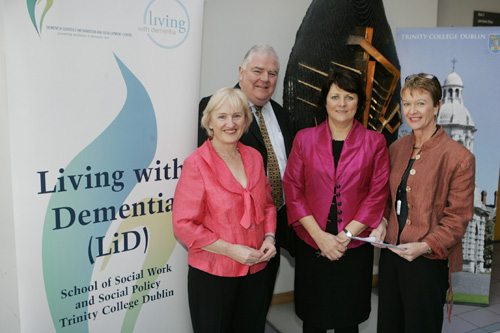Minister for Older People Launches ‘Living with Dementia’ – A Social Research Programme in Dementia Care
Posted on: 04 May 2010
‘Living with Dementia’ is a social research programme in dementia care that aims to tackle the marginalisation of people with dementia, enhance service provision, and improve quality of life for those diagnosed with Alzheimer’s disease and related dementias. The programme was officially launched on Thursday April 29th last by the Minister of State with responsibility for Older People and Health Promotion, Áine Brady.
An estimated 40,000 people in Ireland have dementia. In keeping with the ageing population, these figures are expected to increase exponentially in future years.
“Compared with other chronic illnesses such as stroke, cancer and coronary heart disease, dementia is a costly illness, yet in Ireland, Alzheimer’s disease and the related dementias fail to command significant budgetary and political attention,” says Dr Suzanne Cahill, Research Director of the Living with Dementia Programme at Trinity College Dublin.
“There is no national strategy on dementia in Ireland. At a time when many countries in Europe have well developed strategies, some already implemented, Ireland has no senior civil servants in the Department of Health or in the Health Service Executive with a specialist remit in dementia. Indeed for the individual, worried about memory problems and his or her family caregivers, accessing service supports can be very difficult due to lack of knowledge about service entitlements and in some cases a veritable paucity of relevant services. It has also been noted that in Ireland people with dementia often fall between the cracks of different service delivery systems including Geriatric Medicine, Old Age Psychiatry, Neurology, and Primary Care.”

Patricia Hallahan, Director of the Dementia Services Information & Development Centre, Prof Robbie Gilligan, Head of School of Social Work & Social Policy, Áine Brady TD and Dr Suzanne Cahill, Research Director of the Living with Dementia Programme.
The TCD Living with Dementia (LiD) programme seeks to impact on policy development and to contribute to the design of best practice models for all those affected by Alzheimer’s disease and the related dementias. It is hoped that by creating closer linkages between research, practice and educational settings more timely responsive and accessible interventions will be developed to support the unique and complex needs of this very vulnerable population.
The LiD programme has already made available findings with significant implications for policy. A research study estimating the prevalence of cognitive impairment and dementia in Dublin-based nursing homes has been recently published. The implications of having large numbers of residents with cognitive and memory loss problems in residential care are far-reaching and present serious concerns regarding safety, staff-patient ratios, staff training and recruitment and the physical layout of the buildings among other issues.
The only previous study undertaken on this topic in Ireland had been done in 1988, where cognitive impairment prevalence rates of 58% were estimated across nursing homes in the Eastern Health Board area. New findings from the Living with Dementia study have revealed that a large proportion (89%) of these nursing home residents had a cognitive impairment of whom, 42% were severely, 27% moderately and 20% mildly impaired. Only 14 % of those surveyed had been originally admitted to nursing homes because of dementia and only 32% had a clinical diagnosis of Alzheimer’s Disease or a related dementia.
Other studies which have been recently completed include a study of elderly men and women’s perceptions of quality of life when living in long term care as well as a study about the professional services delivered at Memory Clinics.
Current study projects being undertaken include:
– an investigation into anti-dementia drugs and their impact on quality of life for those with mild to moderate dementia;
– a study examining the relocation and adaptation of persons with more advanced dementia into specialist care units;
– a project looking at the participation levels of older people with a cognitive impairment at hospital discharge planning meetings;
– research examining the potential, supported sheltered housing schemes have in responding to the special needs of people with dementia;
– a study investigating end of life/palliative care for people with end stage dementia;
– the experience of Reminiscence Therapy.
This new research programme aims to train five PhD and five Masters students in the field of dementia care in order to improve practice outcomes and promote the independence and dignity of all those affected by dementia.
An integral feature of the programme is also the hosting of regular research seminars where best international practice and experience is brought to the attention of Irish practitioners, policy makers and academics and where informed debate and discussion takes place.
Health service professionals including nurses, occupational therapists, social workers, speech and language therapists, policy-makers, service planners and service managers from both public and private nursing homes, hospitals and day care centres were in attendance at the launch and seminar day.
The launch preceded a Spring Synapse Research Seminar day hosted by the Dementia Services Information and Development Centre at St James’s Hospital.
The Living with Dementia is based in the School of Social Work and Social Policy at Trinity College and is part of the Dementia Services Information and Development Centre based at St James’s Hospital.
The research programme is funded by The Atlantic Philanthropies.
